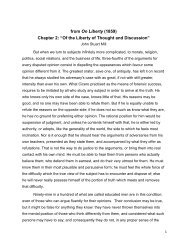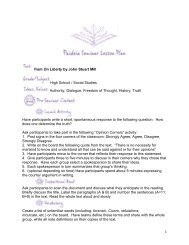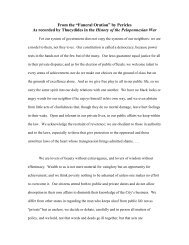Rousseau_contrat-social
Create successful ePaper yourself
Turn your PDF publications into a flip-book with our unique Google optimized e-Paper software.
Everything conspires to take away from a man who is set in authority<br />
over others the sense of justice and reason. Much trouble, we are told,<br />
is taken to teach young princes the art of reigning; but their education<br />
seems to do them no good. It would be better to begin by teaching them<br />
the art of obeying. The greatest kings whose praises history tells were<br />
not brought up to reign: reigning is a science we are never so far from<br />
possessing as when we have learnt too much of it, and one we acquire<br />
better by obeying than by commanding. "Nam utilissimus idem ac<br />
brevissimus bonarum malarumque rerum delectus cogitare quid aut nolueris<br />
sub alio principe, aut volueris."[24]<br />
One result of this lack of coherence is the inconstancy of royal<br />
government, which, regulated now on one scheme and now on another,<br />
according to the character of the reigning prince or those who reign for<br />
him, cannot for long have a fixed object or a consistent policy -- and<br />
this variability, not found in the other forms of government, where the<br />
prince is always the same, causes the State to be always shifting from<br />
principle to principle and from project to project. Thus we may say that<br />
generally, if a court is more subtle in intrigue, there is more wisdom<br />
in a senate, and Republics advance towards their ends by more consistent<br />
and better considered policies; while every revolution in a royal<br />
ministry creates a revolution in the State; for the principle common to<br />
all ministers and nearly all kings is to do in every respect the reverse<br />
of what was done by their predecessors.<br />
This incoherence further clears up a sophism that is very familiar to<br />
royalist political writers; not only is civil government likened to<br />
domestic government, and the prince to the father of a family -- this<br />
error has already been refuted -- but the prince is also freely credited<br />
with all the virtues he ought to possess, and is supposed to be always<br />
what he should be. This supposition once made, royal government is<br />
clearly preferable to all others, because it is incontestably the<br />
strongest, and, to be the best also, wants only a corporate will more in<br />
conformity with the general will.<br />
But if, according to Plato,[25] the "king by nature" is such a rarity,<br />
59











